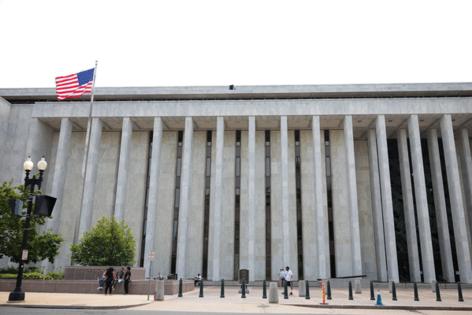Judge declines to halt firing of Copyright Office head Shira Perlmutter
Published in News & Features
WASHINGTON — A federal judge on Wednesday denied Shira Perlmutter’s request to block the Trump administration’s attempt to fire her from her position as the register of copyrights.
In a case that implicates the Constitution’s separation of powers and President Donald Trump’s ongoing efforts to expand the White House’s authority, U.S. District Judge Timothy Kelly ruled that Perlmutter did not meet the “high burden” required for the court to issue a temporary restraining order blocking her termination.
Located within the Library of Congress, the U.S. Copyright Office performs the role of processing applications and administering the copyright system. The librarian of Congress has the statutory authority to appoint the register of copyrights, but earlier this month Trump fired the librarian and then attempted to fire Perlmutter, who filed a lawsuit last week challenging her dismissal.
Perlmutter’s attorneys failed to show she would suffer “irreparable harm” unless the restraining order was issued, Kelly, a Trump appointee, ruled immediately after oral arguments. Kelly ended his remarks emphasizing how quickly the court was moving and that he was not ruling on the merits of the case — that is, whether or not Trump had the authority to fire Perlmutter.
In the courtroom Wednesday, no one questioned what happened — just whether it was legal. On May 8, Trump fired Librarian of Congress Carla Hayden. In accordance with library regulations, the principal deputy librarian, Robert Newlen, took over as acting librarian. Two days later, after the U.S. Copyright Office issued a draft report concluding that not all generative AI training qualifies as “fair use,” a Trump aide emailed Perlmutter, saying she was fired.
Next, the complaint alleges, two Justice Department officials attempted to gain access to the copyright office, showing letters from the White House that purported to appoint Todd Blanche, the deputy attorney general and Trump’s former personal attorney, as the acting librarian and Paul Perkins, an associate deputy attorney general, as the acting register of copyrights, citing the Federal Vacancies Reform Act. That law allows the president to tap a replacement to temporarily serve in an acting capacity without Senate approval if an “officer of an Executive agency” position is vacant. Library staff declined to comply with the DOJ officials.
‘Greater risk of harm’
Perlmutter filed suit last week to enjoin her removal, claiming only the acting librarian of Congress — Newlen, not Blanche — had the authority to remove her and that any finding otherwise would violate the Constitution’s separation of powers.
Reading from the bench, Kelly cited the Supreme Court’s granting a stay of an injunction Thursday in another case involving agency heads challenging their firings. He quoted the Trump v. Wilcox order at length, which stated that hesitancy to suspend the terminations while the lawsuits make their way through the courts “reflects our judgment that the Government faces greater risk of harm from an order allowing a removed officer to continue exercising the executive power than a wrongfully removed officer faces from being unable to perform her statutory duty.”
Legal experts have warned it signals a willingness among the high court’s six conservatives to overturn Humphrey’s Executor v. U.S. — a 90-year-old precedent that allowed Congress to place limits on the president’s ability to remove officers at certain federal agencies, like the National Labor Relations Board.
Kelly also noted in his decision the “striking” absence of Congress from the lawsuit. Perlmutter alleged that she would suffer an irreparable harm in part because letting the president fire someone Congress made an inferior officer to the librarian of Congress would allow the executive branch to abrogate the powers of the legislative branch.
While Democrats and Republicans in Congress have both expressed dismay at Perlmutter’s dismissal — with Senate Majority Leader John Thune, R-S.D., saying lawmakers were investigating the termination’s legality, and House Minority Leader Hakeem Jeffries, D-N.Y., calling it “executive overreach” — Kelly said the fact that Congress did not formally join the lawsuit either as a plaintiff or intervener weakened arguments that the legislative branch’s prerogatives were at risk.
With Republicans in control of both chambers, few observers would expect them to so formally and publicly rebuke the head of their party by joining a lawsuit challenging Trump’s authority. Republicans have, instead, pushed bills aimed at restricting federal courts’ authority to block actions by the administration.
The episode at the Library of Congress has led some Democrats to call for changing how the librarian is hired and fired, removing the president’s role in the process and giving a congressional commission sole power. Congress made that change for the Architect of the Capitol in 2023, after it took President Joe Biden months to fire former Architect J. Brett Blanton following an abuse-of-office scandal.
Reached for comment after the ruling, the White House reiterated its underlying legal position. “All organizations are more effective when leaders are rowing in the same direction,” spokesperson Anna Kelly said in a statement. “President Trump reserves the right to remove employees within his own Executive Branch who exert his executive authority.”
Perlmutter and her legal team declined to speak after the hearing, and the Copyright Office also declined to comment. While the judge’s rejection of a temporary restraining order cannot be appealed, they can now seek a preliminary injunction with the court and, if that were also denied, then appeal that decision to the circuit court.
©2025 CQ-Roll Call, Inc., All Rights Reserved. Visit cqrollcall.com. Distributed by Tribune Content Agency, LLC.







Comments